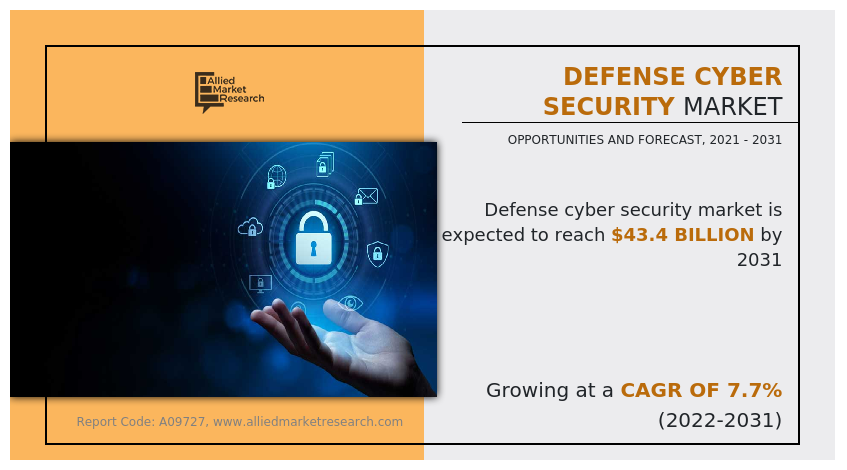According to a new report published by Allied Market Research, titled, “Defense Cyber Security Market,” The defense cyber security market was valued at $21.3 billion in 2021, and is estimated to reach $43.4 billion by 2031, growing at a CAGR of 7.7% from 2022 to 2031.
The concept of defense cyber security is typically attributed to a series of security protocols and controls that are layered throughout an IT network to preserve the integrity and privacy of defense organizations. Every organization has vulnerabilities that an attacker can exploit to gain access and cause damage. Hence, the in depth strategy of defense cyber security is to protect against a wide range of threats and close all of an organization’s security holes in order to protect it effectively against cyber threats.
𝐑𝐞𝐪𝐮𝐞𝐬𝐭 𝐒𝐚𝐦𝐩𝐥𝐞 𝐏𝐚𝐠𝐞𝐬- https://www.alliedmarketresearch.com/request-sample/10092
Furthermore, implementing IT solutions in defense operations has become significant, owing to the growing evolution in the type and occurrence of attacks across the globe. This is anticipated to surge in demand for innovative and modern technologies such as 5G, artificial intelligence, cloud computing, data analytics, cyber security, and autonomous systems across various defense systems. For the past few years, major defense companies such as Thales Group, Northrop Grumman Corporation, Safran SA, and others have established long term contracts with several countries’ governments and governing bodies to install defense cyber security systems. For instance, in September 2020, Northrop Grumman Corporation awarded a task order contract by the U.S. General Services Administration’s (GSA) Federal Systems Integration and Management Center (FEDSIM) and the Defense Intelligence Agency, to help the organization deliver actionable intelligence with speed and enhance decision superiority.
In addition, the defense cyber security market has witnessed significant growth in recent years, owing to the increased dependency of military organizations on the internet network, growing advancements in information technology, and increasing government initiatives to secure critical data. For instance, in March 2021, the government announced its plans regarding National Cyber Force and set up a Cyber Corridor in north of England. This is expected to set out the importance of cyber security to the country’s defense, extending from cyber enhanced battlefield capabilities for the armed forces to internet security for household users.
𝐏𝐫𝐨𝐜𝐮𝐫𝐞 𝐂𝐨𝐦𝐩𝐥𝐞𝐭𝐞 𝐑𝐞𝐬𝐞𝐚𝐫𝐜𝐡 𝐑𝐞𝐩𝐨𝐫𝐭- https://www.alliedmarketresearch.com/defense-cyber-security-market/purchase-options
Also, the increased adoption of machine-to-machine technologies in the aerospace domain and the focus of the governments on enhancing cyber security to counter cyber terrorism has led to the growth of the cyber security market in this sector in the past decade. For instance, in October 2022, BAE Systems introduced a new maintenance capability, Viper Memory Loader Verifier II (MLV II), to defend the onboard systems of F-16 fighter aircraft from cyber-attacks. The new system helps increase the aircraft defense against cyber threats and provides the flight-critical ability to install and verify various software and mission data files onto the aircraft. Furthermore, the companies operating in the defense cyber security market have adopted partnerships, investments, and product launches to increase their market share and expand their geographical presence. For instance, in August 2022, Raytheon Intelligence & Space, a Raytheon Technologies business, entered into a partnership with CrowdStrike, a leader in cloud-delivered protection of endpoints, cloud workloads, identity, and data, to integrate its complementary endpoint security products into RI&S’ Managed Detection and Response (MDR) service.
The factors such as increase in demand for defense IT expenditure, transition, of conventional military aircraft into autonomous aircraft, and growth in cyber-attacks on the regulatory, trade and individuals supplement the growth of the defense cyber security market. However, limited awareness related to cyber security and lack of cyber security professionals or workforce are the factors expected to hamper the growth of the defense cyber security market. In addition, increasing threats and warnings related to cyber-attack on officials and adoption of IoT in cyber security technology creates market opportunities for the key players operating in the defense cyber security market.
𝐈𝐧𝐪𝐮𝐢𝐫𝐲 𝐁𝐞𝐟𝐨𝐫𝐞 𝐁𝐮𝐲𝐢𝐧𝐠- https://www.alliedmarketresearch.com/purchase-enquiry/10092

COVID-19 Impact Analysis:
Governments across the world adopted cyber security automation solutions for their military applications by concentrating on reducing operating expenditures (OPEX) while maintaining adequate measures against cyber threats. For instance, in June 2020, the Australian government decided to spend $1.35 billion towards enhancing the nation’s cyber security capabilities over next decade, under the Cyber Enhanced Situational Awareness and Response (CESAR) package. Under this package, $35 million would be kept for a new cyber threat-sharing platform that can help the government to share intelligence about cyber activity and block emerging threats in the future.
KEY FINDINGS OF THE STUDY
- By type, the network security solutions segment dominated the global Defense Cyber Security market in terms of growth rate during the forecast period.
- By deployment, the cloud segment dominated the global defense cyber security market in terms of growth rate during the forecast period.
- By solution, the managed security segment dominated the global defense cyber security market in terms of growth rate.
- By application, the communication networks segment dominated the global Defense Cyber Security market in terms of growth rate.
The leading players operating in the defense cyber security market are AT&T, BAE Systems, Boeing, Cisco Systems, Inc., DXC Technology Company, EclecticIQ B.V., IBM Corporation, Intel Corporation, Lockheed Martin Corporation, Northrop Grumman Corporation, Privacera, Inc., Raytheon Technologies Corporation, SentineIOne, Secureworks, Inc., and Thales Group.